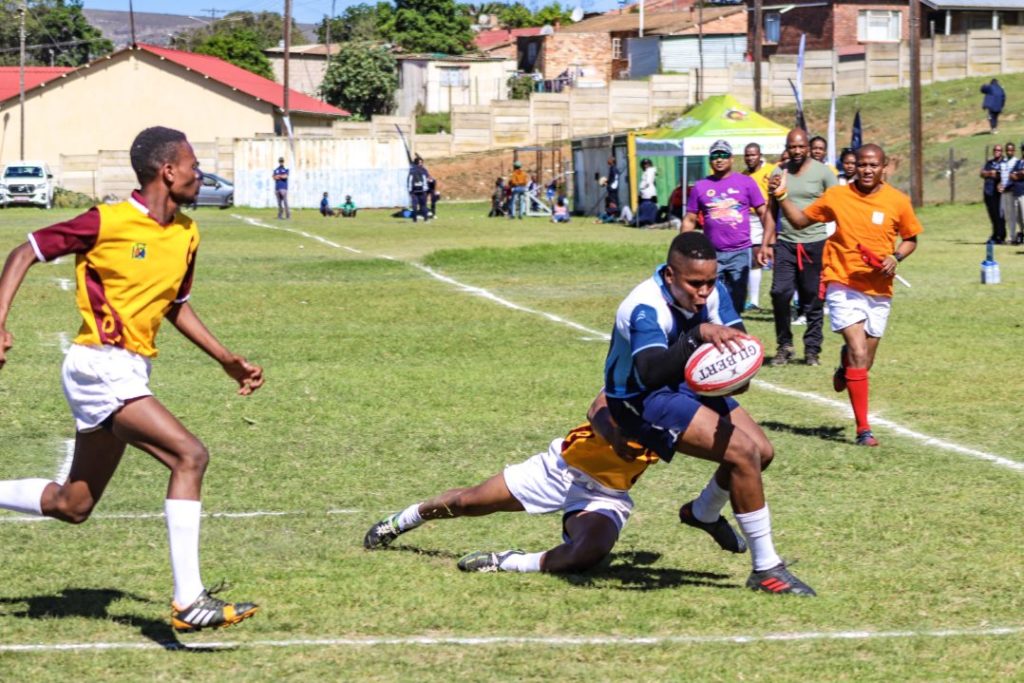By MATTHEW PETERSEN
Years of research and digging through the archives of Makhanda’s longest-serving rugby clubs gave Prof Ashwin Desai and Ashwell Adriaan the idea to tell the untold story of the Eastern Cape’s rugby heritage in Line Breakers: The rugby-playing sons of Makana and Stuurman.
Heritage Day proved the perfect day for the book’s official launch at the Amazwi South African Museum of Literature.
Desai, a Rhodes graduate, is currently a sociology professor at the University of Johannesburg. Ashwell Adriaan is a long-time Makhanda resident, former rugby player, and curator of the Apartheid and Hector Pieterson Museums. He played a significant role in developing rugby in Makhanda during Apartheid.
The two friends have come together to tell this iconic story through archival photographs and sources from the various rugby clubs around Makhanda, which form the basis of the book.
There is very little reported evidence of black rugby, and the story of Makhanda’s rich rugby heritage was largely untold until now.
Representatives from Makhanda’s oldest and most prestigious clubs attended the exhibition, including Winter Rose RFC, Swallows RFC, Lily White RFC, Mary Waters Secondary, Eastern RFC, and Old Collegians RFC.

Desai admits he was immediately interested but was concerned that the task would prove too daunting given the paucity of information.
The idea for the book first emerged in 2006, when Adriaan showed Desai a scattering of photographs. One of the images that first fascinated him was a photograph taken in 1900 of Winter Rose, the first black rugby club formed in 1887.
When Desai saw this picture and other photographs that survived the decades of colonialism and Apartheid, he realised the importance of documenting the emergence of black players from the Eastern Cape.
After the images that spread around the world of Siya Kolisi lifting the Webb Ellis trophy at the 2019 Rugby World Cup, Ashwell and Ashwin decided to re-ignite their idea of publishing the book. In Makhanda, the surname Kolisi dates back as far as the 1940s. Kolisi is often seen as a product of the opportunities provided by the demise of Apartheid and his lucky break to go to a “white” school. But, Kolisi is a product of the Eastern Cape’s long-standing rugby pedigree – Vuyani Kolisi represented the Eastern Province as a number 6 in the 1970s. And Kolisis played the game from the early 1900s.
Khoi chief Dawid Stuurman and Xhosa leader Makana fought iconic struggles against land dispossession in the Eastern Cape in the same way that the rugby players fought against racial barriers.
The title Line Breakers represented the attempts of black players to break down racial barriers in the 1970s. As Apartheid continued to oppress people of colour, the rugby clubs of Makhanda continued to play the game they all loved. It was a space for the oppressed to feel free while trying to fight the regime of Apartheid.
Many of the honourable speakers and representatives told stories of their own experiences and what the game meant to them. It allowed me to recognise how essential sport can be to bringing people together to fight for their beliefs.
Rugby in Makhanda was, for many years, played with little recognition and plenty of passion that never wavered no matter the circumstances.
Ashwin and Ashwell have paid homage to the crucial figures and institutions that have carried Makhanda’s rugby legacy.


